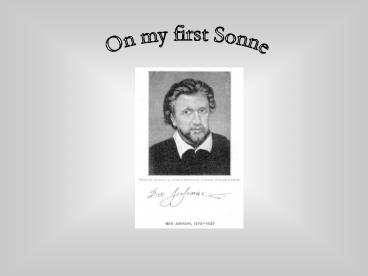Ben Jonson: On my first Sonne PowerPoint PPT Presentation
1 / 9
Title: Ben Jonson: On my first Sonne
1
On my first Sonne
2
About the poet
Name
b.1572 d.1637
Ben Jonson
Occupation
Actor, playwright and poet
Education
The young Jonson attended Westminster School, a
rigorous, classics-minded grammar school. He did
not go to university, probably for reasons of
money, training instead in his step-father's
trade as a bricklayer. However, at some point in
the 1590s he chose to try his luck as a soldier
in the Low Countries where English troops were
involved in the continuing wars between the Dutch
and the Spanish.
3
What is an elegy?
An elegy is a mournful poem or song, a lament for
the dead.
What does lament mean?
Lament means to express sorrow, remorse or
regret. A poem or song in which a death is
lamented.
4
On my first Sonne
Farewell, thou child of my right hand, and joy
My sinne was too much hope of thee, lov'd boy
Seven yeeres thou wert lent to me, and I thee
pay, Exacted by thy fate, on the just day. O,
could I loose all father, now. For why Will man
lament the state he should envie? To have so
soone scap'd worlds, and fleshes rage, And, if
no other miserie, yet age? Rest in soft peace,
and, ask'd, say here doth lye Ben. Jonson his
best piece of poetrie. For whose sake,
hence-forth, all his vowes be such, As what he
loves may never like too much. Ben Jonson 1616
5
Whats the poem about?
Farewell, thou child of my right hand, and joy
My sinne was too much hope of thee, lov'd boy
Seven yeeres thou wert lent to me, and I thee
pay, Exacted by thy fate, on the just day. O,
could I loose all father, now. For why Will man
lament the state he should envie? To have so
soone scap'd worlds, and fleshes rage, And, if
no other miserie, yet age? Rest in soft peace,
and, ask'd, say here doth lye Ben. Jonson his
best piece of poetrie. For whose sake,
hence-forth, all his vowes be such, As what he
loves may never like too much.
The poem records and laments the death of the
poet's first son.
How can we be sure that Jonson is speaking for
and as himself?
Jonson writes as if talking to his son - and as
if he assumes that the boy can hear or read his
words.
What cause does the poet give as to why the boy
died?
6
Farewell, thou child of my right hand, and joy
My sinne was too much hope of thee, lov'd boy
Seven yeeres thou wert lent to me, and I thee
pay, Exacted by thy fate, on the just day. O,
could I loose all father, now. For why Will man
lament the state he should envie? To have so
soone scap'd worlds, and fleshes rage, And, if
no other miserie, yet age? Rest in soft peace,
and, ask'd, say here doth lye Ben. Jonson his
best piece of poetrie. For whose sake,
hence-forth, all his vowes be such, As what he
loves may never like too much.
Explain the paradox Will man lament the state he
should envie?
The boy is going to escape the hardships of life
and the misery of aging.
What does Jonson mean by here doth lye / Ben.
Jonson his best piece of poetrie?
His son is the best thing he ever made.
Comment on the poems form and style?
The poem is 12 lines long and is written using
iambic pentameter. Jonson arranges the lines in
rhyming pairs, which we call couplets.
7
Iambic Pentameter
Iambic pentameter consists of one short syllable
followed by one long syllable one unstressed
syllable, by one pentameter.
When read aloud such verse naturally follows a
beat, similar to that of a human heart beat at
rest. In written form it looks like this
da-dum da-dum da-dum da-dum da-dum
So Jonson's work would follow the pattern
Fare-well thou-child of-my
right-hand and-joy
8
Reflection
What kind of things do we say when sad things
happen?
Where do our loved ones go? Despite supposed
falling attendance in some places of worship,
most people in the UK, when asked, say that they
believe in some kind of God or spiritual
existence. When people die, we often find that we
do believe, or want to believe, that death is not
the end.
What is your belief about such things?
9
(No Transcript)

